- Home
- Beverly Cleary
Henry and the Clubhouse
Henry and the Clubhouse Read online
Beverly Cleary
Henry and The Clubhouse
Illustrated by Tracy Dockray
Contents
1. Henry Goes for a Ride
2. Henry and the New Dog
3. Trick or Treat
4. Henry Collects
5. Ramona and the Clubhouse
6. Henry Writes a Letter
7. Henry’s Little Shadow
About the Author
Other Books by Beverly Cleary
Credits
Copyright
About the Publisher
1
Henry Goes for a Ride
Henry Huggins had a lot of good ideas that fall when he first had his paper route, but somehow his ideas had a way of not turning out as he had planned. Something always went wrong.
There was, for example, that Saturday afternoon in October, when Henry found himself with nothing to do until it was time to start delivering Journals. Naturally he wandered into the kitchen and opened the refrigerator to see what he could find. At the sound of the door opening, his dog Ribsy and his cat Nosy came running in case he should be planning to feed them.
“Henry, you just ate lunch,” said Mrs. Huggins, who had washed her son’s slacks and was now struggling to shove metal stretchers into the legs. “Can’t you find something to do instead of opening the refrigerator every five minutes?”
“I’m thinking, Mom,” answered Henry. He was thinking that he would like to build something, some kind of a house. A doghouse, a tree house, or a clubhouse. A tree house would be pretty hard, but he was sure he could build a doghouse or a clubhouse. All he needed was lumber and nails.
“Well, think with the refrigerator door shut,” suggested Mrs. Huggins with a smile. She had succeeded in stretching Henry’s slacks and now she leaned them, tight on their frames, against the sink. “And please find something to do.”
“OK, Mom,” said Henry, and walked out the back door in search of something to keep him busy. He considered. He could go over to the Quimbys’ house and play checkers with Beezus, a girl whose real name was Beatrice, but her pesty little sister Ramona would probably spoil the game. He could go see if his friend Murph, who was the smartest boy in the whole school, was building anything interesting in his garage. Or he could try to sell subscriptions to the Journal. That was what he should do, but somehow Henry was not anxious to start ringing strange doorbells. No, what he really wanted to do was build something. He decided to scout around Klickitat Street and see if he could find enough boards for a doghouse. That would be the easiest to build and would not take much lumber.
As Henry walked around the side of his house, he noticed his next-door neighbor’s car parked on the driveway with a U-Haul-It trailer attached. Now that was interesting, thought Henry. What was Hector Grumbie going to haul?
The front door of the Grumbies’ house opened, and Mr. Grumbie appeared to be coming out backward. This was even more interesting. Why didn’t Mr. Grumbie walk out frontward? Bit by bit more of his neighbor appeared, and Henry saw that he was tugging at something.
Henry decided he had better investigate. From the Grumbies’ front walk he discovered that Mr. Grumbie was pulling and Mrs. Grumbie was pushing a bathtub out of the house. They were sliding it across the floor on an old blanket.
Mr. Grumbie paused to wipe his forehead. “Whew!” he exclaimed. “These old bathtubs were built like battleships.”
“May I help?” Henry asked eagerly. After all, his mother wanted him to find something to do.
“Sure,” said Mr. Grumbie. “You can get on the other end and help push.”
Henry ran up the steps, and because the bathtub was blocking the door, he climbed into it, out the other side, and joined Mrs. Grumbie in pushing.
Henry was secretly wondering, but was too polite to ask, if the Grumbies were planning to give up bathing. Instead he inquired, “What are you going to do with it?”
“Take it to the dump,” answered Mr. Grumbie, “unless you would like to have it. We are remodeling the bathroom and have to get rid of it to make room for the new tub, which will be delivered Monday.”
Henry thought it over. There were all sorts of interesting things he could do with a bathtub in his backyard. Wash his dog Ribsy in it, cool off in it himself on a hot day, bob for apples at Halloween. Build a clubhouse around it if he had that much lumber. All sorts of things. A bathtub in the yard would be much more fun than a tub in the bathroom, but Henry was sure his mother would not feel the same way about it.
“No, thank you, Mr. Grumbie,” Henry said with regret and then he had a better idea. The new bathtub would come in a crate and perhaps Mr. Grumbie would let him have the boards to build a doghouse.
By that time several neighbors had come over to the Grumbies’ to watch. Even Ribsy had taken an interest and had come down from the Hugginses’ doormat where he had been napping. Mr. Grumbie tied a rope around the tub and with the help of Henry and the bystanders who hung on to the rope, eased the tub, bump-bump-bump, down the front steps, slid it across the lawn, and then boosted it onto the trailer, where Mr. Grumbie tied it securely.
“Want to go for a ride to the dump?” Mr. Grumbie asked Henry.
The dump! Immediately Henry pictured a fascinating jumble of old bathtubs, washing machines, tires, and baby buggies. There was no telling what he might find at the dump. There might even be some old boards he could bring home.
“Can I ride in the bathtub?” he asked eagerly.
“Sure.” Mr. Grumbie was agreeable. “Go ask your mother.”
Henry ran to the open kitchen window. “Hey, Mom! Mr. Grumbie wants me to ride to the dump with him. Can I go?”
“All right, Henry.” Mrs. Huggins’s voice came through the window.
“Come on, Ribsy!” Henry bounded across the lawn and climbed into the bathtub. Ribsy scrambled in behind him.
“All set?” asked Mr. Grumbie, opening the door of his car.
“All set,” answered Henry, and Mr. Grumbie maneuvered the car and trailer down the driveway and into the street.
Riding in a bathtub, which of course had no springs or upholstery, was bumpy, but Henry did not care. No one else in the neighborhood had ever gone for a ride in a bathtub. He shouted and waved to his friends Scooter and Robert, who were playing catch on the sidewalk. They stared after him in surprise. Ribsy put his paws on the edge of the tub and barked.
When Mr. Grumbie stopped at the first stop sign, Henry saw his friend Beezus and her little sister Ramona, who had a lot of string stuck to her chin with Scotch tape. Henry guessed she was trying to copy one of the many disguises of Sheriff Bud on television. Ramona never missed the Sheriff Bud program.
“Hi!” called Henry.
“Hello, Henry.” Beezus looked with admiration at Henry in the bathtub. He could tell she wished she could go for a ride in a bathtub, too.
Ramona scowled ferociously and pointed straight at Henry. “Remember—only you can prevent forest fires.”
Henry ignored Ramona. He knew she was only repeating what she had heard Smokey Bear say on television all summer. “So long!” he called to Beezus as Mr. Grumbie drove on.
Ribsy, tired of barking over the edge of the tub, curled up and tried to go to sleep, but whenever the trailer went over a bump, he lifted his head and looked annoyed. In the bathtub little bumps felt like big bumps. They rumbled and bumped down Klickitat Street to a main thoroughfare, and then Henry had an idea. He was the president of the United States riding in a parade! He sat up straight in the bathtub, nodding and waving and doffing an imaginary hat. Mr. Grumbie’s car became a column of tanks preceding him down the avenue, and one airplane in the sky became a formation of fighter planes overhead. Henry could practi
cally hear the cheers of the throngs crowded along the curbs to watch his journey to the White House.
Henry did in fact hear a few real cheers, or perhaps jeers was a better word, mostly from boys along the way.
“Hey! Don’t forget to wash your back!”
“Be careful! Don’t step on the soap!”
With great dignity Henry nodded and waved. A great man on his way to the White House could afford to ignore such people, especially when he was surrounded by Secret Service men.
Henry was having too much fun to act dignified very long. He saw several boys standing in front of a bicycle shop and could not resist waving and shouting, “Hats off! The flag is passing by!”
“Boo!” yelled the boys. “Boo! Boo!” They held their noses and waved Henry on down the street.
Ribsy scrambled to his feet and barked over the edge of the tub. Henry, who was the kind of man who would take his dog to the White House, folded his arms and grinned in a superior manner, because he was riding in the bathtub and the boys were standing on the sidewalk. The afternoon had turned out better than he had expected, and he still had the dump to look forward to.
And then Henry passed a Journal truck heading in the opposite direction. Suddenly he was no longer president of the United States. He was no longer interested in lumber for a doghouse. He was plain Henry Huggins, a boy who had completely forgotten that he had forty-three papers to deliver this afternoon. This was terrible! If he did not get those papers delivered, his route might be taken away from him before he had had it a month. Then, because he was the youngest Journal carrier in the neighborhood, Mr. Capper, who was the district manager, and everyone else, would say he was not old enough to handle a route. And that would be about the worst thing that could possibly happen. He would never live it down.
“Mr. Grumbie! Mr. Grumbie!” yelled Henry, but Mr. Grumbie drove on down the street unaware that he was carrying his passenger farther and farther from his paper route.
“Mr. Grumbie! Mr. Grumbie!” There was no response but the bump and rattle of the trailer. Henry was trapped in a bathtub in the middle of Lombard Street. “Mr. Grumbie! Mr. Grumbie!”
At the next stop sign Henry stood up in the bathtub and frantically waved both hands, hoping to attract Mr. Grumbie’s attention in the rearview mirror.
It worked, because Mr. Grumbie stuck his head out the window and called, “Something wrong back there?”
“My route!” yelled Henry. “I forgot my paper route!”
The signal changed and cars and trucks began to honk. Mr. Grumbie, in the center lane of traffic, had to drive on.
Henry sat down with a bump. The Saturday afternoon traffic was heavy and it would be difficult for Mr. Grumbie to change lanes while pulling a trailer. They were still in the center lane when they came to the next stop sign.
“I’ll pull over as soon as I can,” Mr. Grumbie called back to Henry.
Henry now felt ridiculous sitting in the bathtub in the middle of a heavily traveled street. He wondered why he had thought riding in a tub would be fun in the first place. A boy who was old enough to have a paper route was too old to do such a silly thing. Cross street after cross street went by and Henry was carried farther and farther from his route. By this time the other boys were counting and folding their papers and Mr. Capper was probably wondering what had happened to Henry, the youngest carrier. Maybe Mr. Capper was already wondering what boy could take over Henry’s route. Maybe he was saying to Scooter and the other boys, “I’m afraid Henry isn’t old enough to handle a route. Do you know any older boy who could take his place?” It was not a happy prospect.
A gap appeared in the right-hand lane of traffic and Mr. Grumbie eased his car and the trailer into it. There was a solid line of cars parked along the curb, and no place to stop. Another block went by. Still there was no place where Mr. Grumbie could stop. Henry caught a glimpse of a clock inside a dry-cleaning shop. Four thirty-five. He would never get to the district manager’s garage and get his papers folded and delivered by six o’clock.
Mr. Grumbie signaled and made a right turn into a service station. Henry, followed by Ribsy, scrambled out of the bathtub as Mr. Grumbie got out of his car.
“I’m sure sorry I forgot about my route,” Henry apologized.
“What are we going to do about it?” asked Mr. Grumbie. “I can’t turn around and take you home now, because the dump closes at five and I’ve got to get rid of this tub this weekend. Besides, I am renting the trailer by the hour and I want to get it back as soon as I can.”
“That’s all right,” said Henry. “I have enough money for bus fare.”
“Do you know the way home?” asked Mr. Grumbie.
“Sure. I can catch the bus across the street and I know where to transfer to the other bus.” Henry was eager to be on his way.
“OK,” agreed Mr. Grumbie, and climbed back into his car.
“Wait!” yelled Henry as Mr. Grumbie started to drive off. “Ribsy! Can you take Ribsy with you? I can’t take him on the bus.”
Across the street a bus pulled up to the stop, discharged a passenger, and departed with a puff of exhaust.
“I guess so. Come on, pooch.” Mr. Grumbie opened the rear door of his car and Henry shoved Ribsy inside and slammed the door. He knew from past experience that a dog was not allowed on a bus unless it was in a box tied shut. Henry had enough problems without searching for a box.
When Mr. Grumbie drove off, Henry waited for the traffic light to change from red to green before he crossed the street to the bus stop. He had just missed a bus, he knew, and as he wondered how long he would have to wait for the next bus, he fingered the change in the pocket of his jeans. Bus fare and a dime left over. Enough for one telephone call. Probably he should call one of the boys and ask him to go over to Mr. Capper’s garage and start folding his papers for him. But which boy? He had only one dime. What if he called Robert’s house and Robert’s mother answered and said he wasn’t home? His dime would be gone.
Henry decided to telephone his own house and ask his mother to call Robert or Murph for him. Once more Henry waited for the traffic signal to change, ran back across the street, and into the glass telephone booth in the corner of the service station. He pushed his dime into the smallest hole, dialed, and counted four rings.
“Hello?” It was Mrs. Huggins.
“Say, Mom,” began Henry, his eye on the bus stop, “my paper route sort of slipped my mind and I wondered if you would phone Robert or Murph or one of the fellows and ask them to fold my papers for me. I’ll get there as soon as I can.”
“Henry, where are you?” asked Mrs. Huggins.
“In a filling station out on Lombard Street,” answered Henry.
“It is twenty minutes to five now.” Mrs. Huggins sounded exasperated. “You’ll never get your papers delivered on time.”
“Mom, I can’t stand here all day arguing,” Henry pointed out as a bus pulled up to the curb. “Here’s my bus now!”
“Honestly, Henry, sometimes I wonder—”
Henry had to cut his mother off.
The traffic signal changed to red just as Henry reached the curb. “Hey, Mr. Bus Driver!” Henry called frantically. The bus driver glanced at him and pulled out into the stream of traffic. He had a schedule to follow and could not wait for one boy. Henry groaned and then he discovered it was not even his bus.
When the signal changed to green Henry walked across the street. He had done all he could do to get his route started and there was no use worrying about it. But Henry did worry. He wondered if his mother was able to find a boy to fold his papers and what Mr. Capper would say when the boy folded Henry’s Journals. Henry worried when the bus finally came. He worried while he rode on what seemed to be the slowest bus in the world. He worried when he got off and waited for the second bus. He worried when he had transferred to the second bus, which seemed even slower. If there was ever a contest to find the slowest bus in the world, this bus would win. A snail could beat it an
y day.
And then as the bus finally reached Henry’s neighborhood and drove down one of the streets on which Henry should have been delivering papers that very minute, Henry saw a car exactly like the Hugginses’ car. In fact, it was the Hugginses’ car. Henry could tell, because he saw his mother get out and throw a folded Journal toward a house. She threw awkwardly. The paper did not go far enough so she picked it up and threw again. Henry was horrified. A boy did not want to see his mother delivering papers, especially when she was such a terrible thrower. It was awful. He did not see how anybody could grow up and throw that way.
Hastily Henry jerked the cord that stopped the bus at the next corner. He bounded out of the door and ran back to Mrs. Huggins, who was consulting his route book to see where to throw the next paper. Henry could not help feeling that he had reached her in the nick of time. He did not want the passengers on the bus to see her throw again.
“Hey, Mom,” he panted. “How come you’re delivering my papers?”
“There wasn’t anyone else to do it,” answered his mother. “I couldn’t reach Robert or Murph so I drove over to Mr. Capper’s and found the other carriers were leaving with their papers. I’ve delivered twenty-eight of them.”
“Gee, Mom, did you fold my papers?” asked Henry. If she had she was better at folding than throwing.
“The other boys had already folded them for you,” answered his mother. “They must have known you were going to be late.”
Henry opened the car door and pulled out his bag of Journals. “I’ll take over, Mom,” he said, as he slipped the bag over his shoulders. “Thanks a lot. You saved my life.”
“You’re welcome,” answered Mrs. Huggins and then added, “I guess,” as she climbed into the car.
Henry had to know something. “What did Mr. Capper say?” he called after his mother.

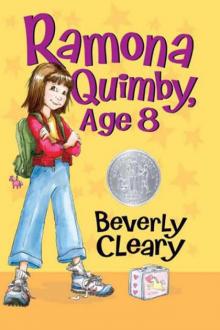 Ramona Quimby, Age 8
Ramona Quimby, Age 8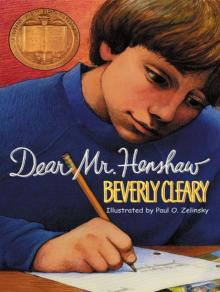 Dear Mr. Henshaw
Dear Mr. Henshaw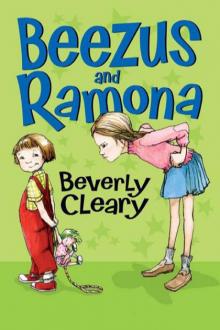 Beezus and Ramona
Beezus and Ramona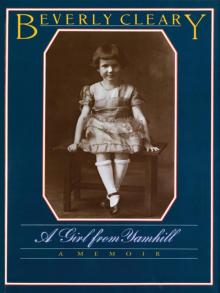 A Girl from Yamhill
A Girl from Yamhill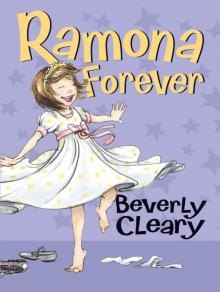 Ramona Forever
Ramona Forever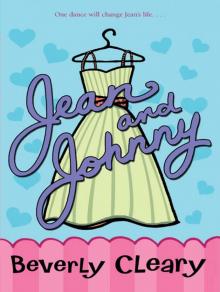 Jean and Johnny
Jean and Johnny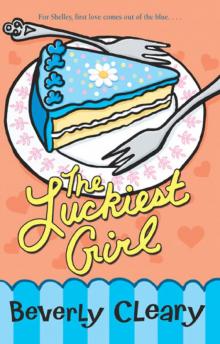 The Luckiest Girl
The Luckiest Girl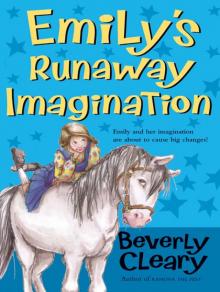 Emily's Runaway Imagination
Emily's Runaway Imagination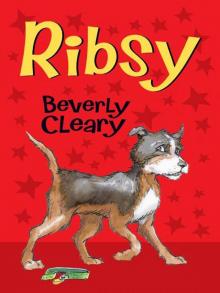 Ribsy
Ribsy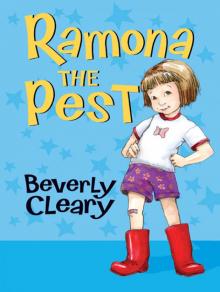 Ramona the Pest
Ramona the Pest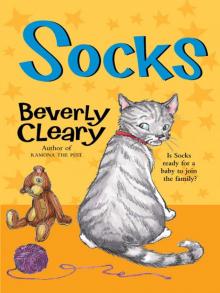 Socks
Socks Ramona's World
Ramona's World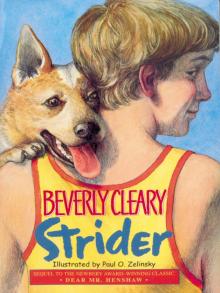 Strider
Strider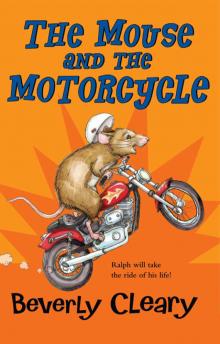 The Mouse and the Motorcycle
The Mouse and the Motorcycle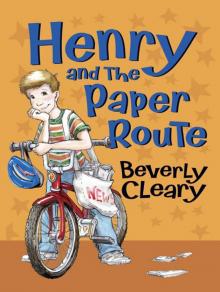 Henry and the Paper Route
Henry and the Paper Route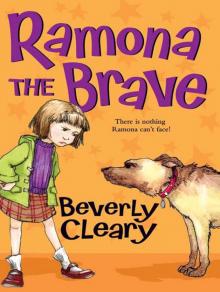 Ramona the Brave
Ramona the Brave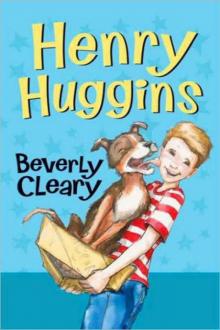 Henry Huggins
Henry Huggins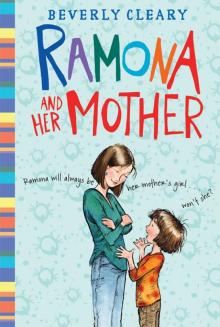 Ramona and Her Mother
Ramona and Her Mother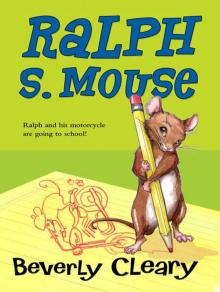 Ralph S. Mouse
Ralph S. Mouse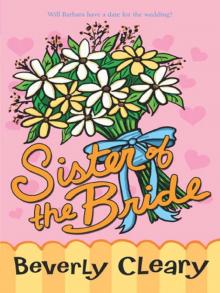 Sister of the Bride
Sister of the Bride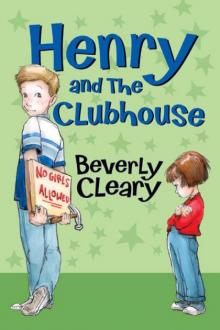 Henry and the Clubhouse
Henry and the Clubhouse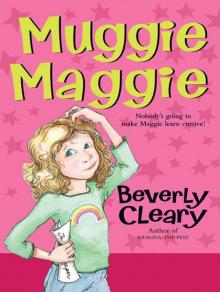 Muggie Maggie
Muggie Maggie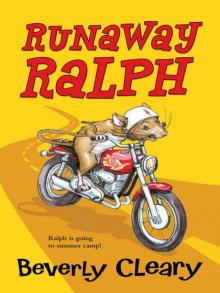 Runaway Ralph
Runaway Ralph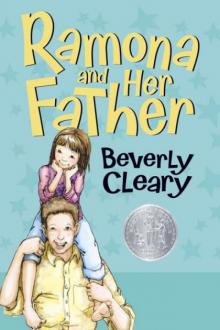 Ramona and Her Father
Ramona and Her Father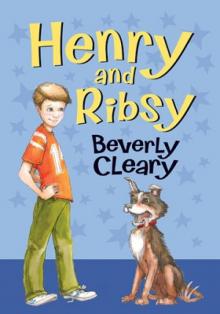 Henry and Ribsy
Henry and Ribsy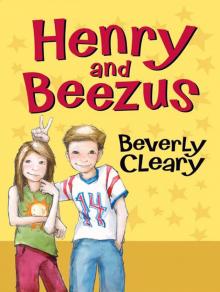 Henry and Beezus
Henry and Beezus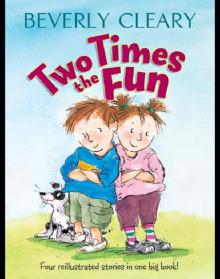 Two Times the Fun
Two Times the Fun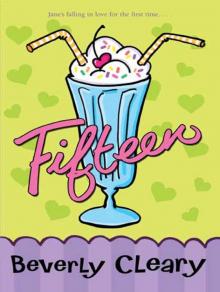 Fifteen
Fifteen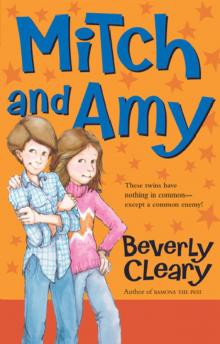 Mitch and Amy
Mitch and Amy